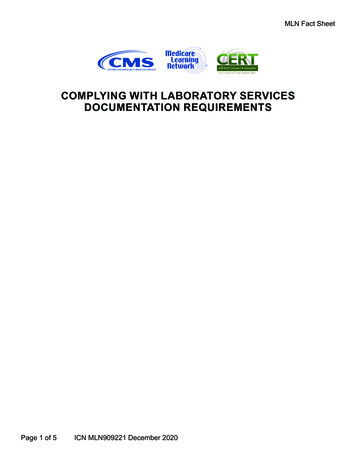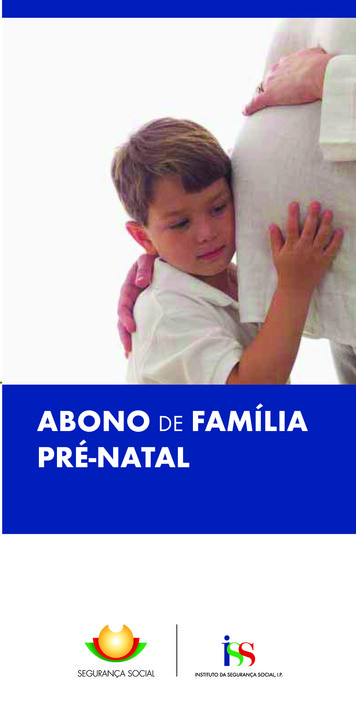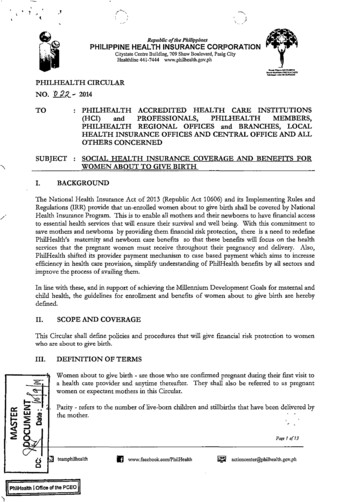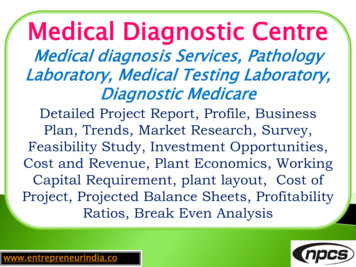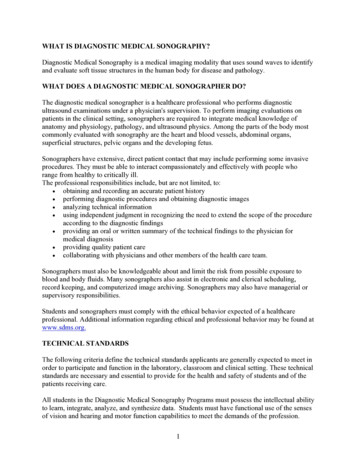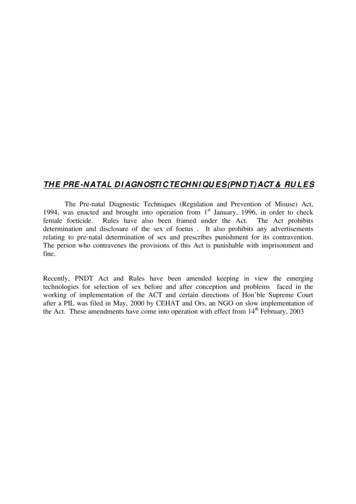
Transcription
THE PRE-NATAL DIAGNOSTIC TECHNIQUES (PNDT) ACT & RULESThe Pre-natal Diagnostic Techniques (Regulation and Prevention of Misuse) Act,1994, was enacted and brought into operation from 1st January, 1996, in order to checkfemale foeticide. Rules have also been framed under the Act. The Act prohibitsdetermination and disclosure of the sex of foetus . It also prohibits any advertisementsrelating to pre-natal determination of sex and prescribes punishment for its contravention.The person who contravenes the provisions of this Act is punishable with imprisonment andfine.Recently, PNDT Act and Rules have been amended keeping in view the emergingtechnologies for selection of sex before and after conception and problems faced in theworking of implementation of the ACT and certain directions of Hon’ble Supreme Courtafter a PIL was filed in May, 2000 by CEHAT and Ors, an NGO on slow implementation ofthe Act. These amendments have come into operation with effect from 14th February, 2003
THE PRE-NATAL DIAGNOSTIC TECHNIQUES (REGULATION ANDPREVENTION OF MISUSE) ACT, 1994ACT NO. 57 OF 1994[20th September, 1994]An Act to provide for the regulation of the use of pre-natal diagnostic techniques for the purpose ofdetecting genetic or metabolic disorders or chromosomal abnormalities or certain congenitalmalformations or sex linked disorders and for the prevention of the misuse of such techniques for thepurpose of pre-natal sex determination leading to female foeticide; and, for matters connected therewith or incidental thereto.BE it enacted by Parliament in the Forty-fifth Year of the Republic of India as follows:--CHAPTER IPRELIMINARY1.Short title, extent and commencement.- (1) This Act may be called the Pre-natal DiagnosticTechniques (Regulation and Prevention of Misuse) Act, 1994.(2) It shall extend to the whole of India except the State of Jammu and Kashmir.(3) It shall come into force on such date as the Central Government may, by notification in the OfficialGazette, appoint.2. Definitions.- In this Act, unless the context otherwise requires,-(a) "Appropriate Authority" means the Appropriate Authority appointed under section 17;(b) "Board" means the Central Supervisory Board constituted under section 7;(c) "Genetic Counseling Centre" means an institute, hospital, nursing home or any place, bywhatever name called, which provides for genetic counselling to patients;(d) "Genetic Clinic" means a clinic, institute, hospital, nursing home or any place, by whatever namecalled, which is used for conducting pre-natal diagnostic procedures;(e) "Genetic Laboratory" means a laboratory and includes a place where facilities are provided forconducting analysis or tests of samples received from Genetic Clinic for pre-natal diagnostic test;(f) "Gynecologist" means a person who possesses a post- graduate qualification in gynecology andobstetrics;(g) "Medical geneticist" means a person who possesses a degree or diploma or certificate in medicalgenetics in the field of pre-natal diagnostic techniques or has experience of not less than two years insuch field after obtaining-(i) any one of the medical qualifications recognised under the Indian Medical Council Act, 1956(102 of 1956); or(ii) a post-graduate degree in biological sciences;(h) "Pediatrician" means a person who possesses a post- graduate qualification in pediatrics;(i) "pre-natal diagnostic procedures" means all gynecological or obstetrical or medical proceduressuch as ultrasonography foetoscopy, taking or removing samples of amniotic fluid, chorionic villi,blood or any tissue of a pregnant woman for being sent to a Genetic Laboratory or Genetic Clinic forconducting pre-natal diagnostic test;(j) "pre-natal diagnostic techniques" includes all pre-natal diagnostic procedures and pre-nataldiagnostic tests;(k) "pre-natal diagnostic test" means ultrasonography or any test or analysis of amniotic fluid,chorionic villi, blood or any tissue of a pregnant woman conducted to detect genetic or metabolicdisorders or chromosomal abnormalities or congenital anomalies or haemoglobinopathies or sexlinked diseases;(l) "prescribed" means prescribed by rules made under this Act;
(m) "registered medical practitioner" means a medical practitioner who possesses any recognisedmedical qualification as defined in clause (h) of section 2 of the Indian Medical Council Act, 1956,(102 of 1956.) and whose name has been entered in a State Medical Register;(n) "regulations" means regulations framed by the Board under this Act.CHAPTER IIREGULATION OF GENETIC COUNSELLING CENTRES, GENETIC LABORATORIES ANDGENETIC CLINICS3. Regulation of Genetic Counselling Centres, Genetic Laboratories andGenetic Clinics.- On and from the commencement of this Act,-(1) no Genetic Counselling Centre, Genetic Laboratory or Genetic Clinic unlessregistered under this Act, shall conduct or associate with, or help in, conductingactivities relating to pre-natal diagnostic techniques;(2) no Genetic Counselling Centre, Genetic Laboratory or Genetic Clinic shallemploy or cause to be employed any person who does not possess the prescribedqualifications;(3) no medical geneticist, gynaecologist, paediatrician, registered medicalpractitioner or any other person shall conduct or cause to be conducted or aid inconducting by himself or through any other person, any pre-natal diagnostictechniques at a place other than a place registered under this Act.CHAPTER IIIREGULATION OF PRE-NATAL DIAGNOSTIC TECHNIQUES4. Regulation of pre-natal diagnostic techniques.- On and from the commencement of this Act,-(1) no place including a registered Genetic Counselling Centre or Genetic Laboratory or Genetic Clinicshall be used or caused to be used by any person for conducting pre-natal diagnostic techniquesexcept for the purposes specified in clause (2) and after satisfying any of the conditions specified inclause (3);(2) no pre-natal diagnostic techniques shall be conducted except for the purposes of detection of anyof the following abnormalities, namely:-(i)(ii)(iii)(iv)(v)(vi)chromosomal abnormalities;genetic metabolic diseases;haemoglobinopathies;sex-linked genetic diseases;congenital anomalies;any other abnormalities or diseases as may be specified by the Central SupervisoryBoard;(3) no pre-natal diagnostic techniques shall be used or conducted unless the person qualified to do sois satisfied that any of the following conditions are fulfilled, namely:-(i) age of the pregnant woman is above thirty-five years;(ii) the pregnant woman has undergone of two or more spontaneous abortions or foetal loss;(iii) the pregnant woman had been exposed to potentially teratogenic agents such as drugs,radiation, infection or chemicals;
(iv) the pregnant woman has a family history of mental retardation or physical deformitiessuch as spasticity or any other genetic disease;(v) any other condition as may be specified by the Central Supervisory Board;(4) no person, being a relative or the husband of the pregnant woman shall seek or encourage theconduct of any pre-natal diagnostic techniques on her except for the purpose specified in clause (2).5. Written consent of pregnant woman and prohibition of communicating the sex of foetus. (1)No person referred to in clause (2) of section 3 shall conduct the pre-natal diagnostic proceduresunless—(a)(b)(c)he has explained all known side and after effects of such procedures to thepregnant woman concerned;he has obtained in the prescribed form her written consent to undergo suchprocedures in the language which she understands; anda copy of her written consent obtained under clause (b) is given to the pregnantwoman.(2) No person conducting pre-natal diagnostic procedures shall communicate to the pregnant womanconcerned or her relatives the sex of the foetus by words, signs or in any other manner.6. Determination of sex prohibited.- On and from the commencement of this Act,-(a)(b)no Genetic Counselling Centre or Genetic Laboratory or Genetic Clinic shallconduct or cause to be conducted in its Centre, Laboratory or Clinic, pre-nataldiagnostic techniques including ultrasonography, for the purpose ofdetermining the sex of a foetus;no person shall conduct or cause to be conducted any pre-natal diagnostictechniques including ultrasonography for the purpose of determining the sex ofa foetus.CHAPTER IVCENTRAL SUPERVISORY BOARD7. Constitution of Central Supervisory Board.- (1) The Central Government shall constitute aBoard to be known as the Central Supervisory Board to exercise the powers and perform thefunctions conferred on the Board under this Act.(2) The Board shall consist of—(a)the Minister in charge of the Ministry or Department of Family Welfare, whoshall be the Chairman, ex officio;(b)the Secretary to the Government of India in charge of the Department of FamilyWelfare, who shall be the Vice-Chairman, ex-officio;(c)two members to be appointed by the Central Government to represent theMinistries of Central Government in charge of Woman and Child Development and of Lawand Justice, ex-officio;(d)the Director General of Health Services of the Central Government, ex officio;(e)ten members to be appointed by the Central Government, two each fromamongst—(i)(ii)(iii)(iv)(v)eminent medical geneticists;eminent gynaecologists and obstetricians;eminent paediatricians;eminent social scientists; andrepresentatives of women welfare organisations;
(f)three women Members of Parliament, of whom two shall be elected by theHouse of the People and one by the Council of States;(g)four members to be appointed by the Central Government by rotation torepresent the States and the Union territories, two in the alphabetical order and two in thereverse alphabetical order:Provided that no appointment under this clause shall be made except on therecommendation of the State Government or, as the case may be, the Unionterritory;(h)an officer, not below the rank of a Joint Secretary or equivalent of the CentralGovernment, in charge of Family Welfare, who shall be the Member-Secretary, ex officio.8. Term of office of members.- (1) The term of office of a member, other than an ex officio member,shall be,-(a)in case of appointment under clause (e) or clause (f) ofsub-section (2) of section 7, three years; and(b)in case of appointment under clause (g) of the saidsubsection, one year.(2) If a casual vacancy occurs in the office of any other members, whether by reason of his death,resignation or inability to discharge his functions owing to illness or other incapacity, such vacancyshall be filled by the Central Government by making a fresh appointment and the member soappointed shall hold office for the remainder of the term of office of the person in whose place he is soappointed.(3) The Vice-Chairman shall perform such functions as may be assigned to him by the Chairman fromtime to time.(4) The procedure to be followed by the members in the discharge of their functions shall be such asmay be prescribed.9. Meetings of the Board.- (1) The Board shall meet at such time and place, and shall observe suchrules of procedure in regard to the transaction of business at its meetings (including the quorum atsuch meetings) as may be provided by regulations:Provided that the Board shall meet at least once in six months.(2) The Chairman and in his absence the Vice-Chairman shall preside at the meetings of the Board.(3) If for any reason the Chairman or the Vice-Chairman is unable to attend any meeting of the Board,any other member chosen by the members present at the meeting shall preside at the meeting.(4) All questions which come up before any meeting of the Board shall be decided by a majority of thevotes of the members present and voting, and in the event of an equality of votes, the Chairman, or inhis absence, the person presiding, shall have and exercise a second or casting vote.(5) Members other than ex officio members shall receive such allowances, if any, from the Board asmay be prescribed.10. Vacancies, etc., not to invalidate proceedings of the Board.- No act or proceeding of theBoard shall be invalid merely by reason of—(a) any vacancy in, or any defect in the constitution of, the Board; or(b) any defect in the appointment of a person acting as a member of the Board; or(c) any irregularity in the procedure of the Board not affecting the merits of the case.11. Temporary association of persons with the Board for particular purposes. (1) The Boardmay associate with itself, in such manner and for such purposes as may be determined byregulations, any person whose assistance or advice it may desire in carrying out any of the provisionsof this Act.(2) A person associated with it by the Board under sub-section (1) for any purpose shall have a rightto take part in the discussions relevant to that purpose, but shall not have a right to vote at a meetingof the Board and shall not be a member for any other purpose.12. Appointment or officers and other employees of the Board.- (1) For the purpose of enabling itefficiently to discharge its functions under this Act, the Board may, subject to such regulations as maybe made in this behalf, appoint (whether on deputation or otherwise) such number of officers andother employees as it may consider necessary:
Provided that the appointment of such category of officers, as may be specified in suchregulations, shall be subject to the approval of the Central Government.(2) Every officer or other employee appointed by the Board shall be subject to such conditions ofservice and shall be entitled to such remuneration as may be specified in the regulations.13. Authentication of orders and other instruments of the Board.- All orders and decisions of theBoard shall be authenticated by the signature of the Chairman or any other member authorised by theBoard in this behalf, and all other instruments issued by the Board shall be authenticated by thesignature of the Member-Secretary or any other officer of the Board authorised in like manner in thisbehalf.14. Disqualifications for appointment as member.- A person shall be disqualified for beingappointed as a member if, he—(a)has been convicted and sentenced to imprisonment for an offence which, in theopinion of the Central Government, involves moral turpitude; or(b)is an undischarged insolvent; or(c)is of unsound mind and stands so declared by a competent court; or(d)has been removed or dismissed from the service of the Government or aCorporation owned or controlled by the Government; or(e)has, in the opinion of the Central Government, such financial or other interest inthe Board as is likely to affect prejudicially the discharge by him of his functions as a member;or(f)has, in the opinion of the Central Government, been associated with the use orpromotion of pre-natal diagnostic technique for determination of sex.15. Eligibility of member for reappointment.- Subject to the other terms and conditions of serviceas may be prescribed, any person ceasing to be a member shall be eligible for reappointment as suchmember.16. Functions of the Board. - The Board shall have the following functions, namely:-(i) to advise the Government on policy matters relating to use of pre-natal diagnostictechniques;(ii) to review implementation of the Act and the rules made thereunder and recommendchanges in the said Act and rules to the Central Government;(iii) to create public awareness against the practice of pre-natal determination of sex andfemale foeticide;(iv) to lay down code of conduct to be observed by persons working at Genetic CounsellingCentres, Genetic Laboratories and Genetic Clinics;(v) any other functions as may be specified under the Act.CHAPTER VAPPROPRIATE AUTHORITY AND ADVISORY COMMITTEE17. Appropriate Authority and Advisory Committee.- (1) The Central Government shall appoint, bynotification in the Official Gazette, one or more Appropriate Authorities for each of the Union territoriesfor the purposes of this Act.(2) The State Government shall appoint, by notification in the Official Gazette, one or moreAppropriate Authorities for the whole or part of the State for the purposes of this Act having regard tothe intensity of the problem of pre-natal sex determination leading to female foeticide. (3) The officersappointed as Appropriate Authorities under sub- section (1) or sub-section (2) shall be,-(a)when appointed for the whole of the State or the Union territory, of or above therank of the Joint Director of Health and Family Welfare; and(b)when appointed for any part of the State or the Union territory, of such otherrank as the State Government or the Central Government, as the case may be, may deem fit.
(4) The Appropriate Authority shall have the following functions, namely:-(a)to grant, suspend or cancel registration of a Genetic Counselling Centre,Genetic Laboratory or Genetic Clinic;(b)to enforce standards prescribed for the Genetic Counselling Centre, GeneticLaboratory and Genetic Clinic;(c)to investigate complaints of breach of the provisions of this Act or the rulesmade thereunder and take immediate action; and(d)to seek and consider the advice of the Advisory Committee, constituted undersub-section (5), on application for registration and on complaints for suspension orcancellation of registration.(5) The Central Government or the State Government, as the case may be, shall constitute anAdvisory Committee for each Appropriate Authority to aid and advise the Appropriate Authority in thedischarge of its functions, and shall appoint one of the members of the Advisory Committee to be itsChairman.(6) The Advisory Committee shall consist of—(a)three medical experts from amongst gynaecologists, obstericians,paediatricians and medical geneticists;(b)one legal expert;(c)one officer to represent the department dealing with information and publicity ofthe State Government or the Union territory, as the case may be;(d)three eminent social workers of whom not less than one shall be from amongstrepresentatives of women's organisations.(7) No person who, in the opinion of the Central Government or the State Government, as the casemay be, has been associated with the use or promotion of pre-natal diagnostic technique fordetermination of sex shall be appointed as a member of the Advisory Committee.(8) The Advisory Committee may meet as and when it thinks fit or on the request of the AppropriateAuthority for consideration of any application for registration or any complaint for suspension orcancellation of registration and to give advice thereon:Provided that the period intervening between any two meetings shall not exceed theprescribed period.(9) The terms and conditions subject to which a person may be appointed to the Advisory Committeeand the procedure to be followed by such Committee in the discharge of its functions shall be such asmay be prescribed.CHAPTER VIREGISTRATION OF GENETIC COUNSELLING CENTRES, GENETIC LABORATORIES ANDGENETIC CLINICS18. Registration of Genetic Counselling Centres, Genetic Laboratories or Genetic Clinics. (1)No person shall open any Genetic Counselling Centre, Genetic Laboratory or Genetic Clinic after thecommencement of this Act unless such Centre, Laboratory or Clinic is duly registered separately orjointly under this Act.(2) Every application for registration under sub-section (1), shall be made to the Appropriate Authorityin such form and in such manner and shall be accompanied by such fees as may be prescribed.(3) Every Genetic Counselling Centre, Genetic Laboratory or Genetic Clinic engaged, either partly orexclusively, in counselling or conducting pre-natal diagnostic techniques for any of the purposesmentioned in section 4, immediately before the commencement of this Act, shall apply for registrationwithin sixty days from the date of such commencement.(4) Subject to the provisions of section 6, every Genetic Counselling Centre, Genetic Laboratory orGenetic Clinic engaged in counselling or conducting pre-natal diagnostic techniques shall cease toconduct any such counselling or technique on the expiry of six months from the date ofcommencement of this Act unless such Centre, Laboratory or Clinic has applied for registration and isso registered separately or jointly or till such application is disposed of, whichever is earlier.
(5) No Genetic Counselling Centre, Genetic Laboratory or Genetic Clinic shall be registered underthis Act unless the Appropriate Authority is satisfied that such Centre, Laboratory or Clinic is in aposition to provide such facilities, maintain such equipment and standards as may be prescribed.19. Certificate of registration.- (1) The Appropriate Authority shall, after holding an inquiry and aftersatisfying itself that the applicant has complied with all the requirements of this Act and the rulesmade thereunder and having regard to the advice of the Advisory Committee in this behalf, grant acertificate of registration in the prescribed form jointly or separately to the Genetic Counselling Centre,Genetic Laboratory or Genetic Clinic, as the case may be.(2) If, after the inquiry and after giving an opportunity of being heard to the applicant and havingregard to the advice of the Advisory Committee, the Appropriate Authority is satisfied that theapplicant has not complied with the requirements of this Act or the rules, it shall, for reasons to berecorded in writing, reject the application for registration.(3) Every certificate of registration shall be renewed in such manner and after such period and onpayment of such fees as may be prescribed.(4) The certificate of registration shall be displayed by the registered Genetic Counselling Centre,Genetic Laboratory or Genetic Clinic in a conspicuous place at its place of business.20. Cancellation or suspension of registration.- (1) The Appropriate Authority may suo moto, or oncomplaint, issue a notice to the Genetic Counselling Centre, Genetic Laboratory or Genetic Clinic toshow cause why its registration should not be suspended or cancelled for the reasons mentioned inthe notice.(2) If, after giving a reasonable opportunity of being heard to the Genetic Counselling Centre, GeneticLaboratory or Genetic Clinic and having regard to the advice of the Advisory Committee, theAppropriate Authority is satisfied that there has been a breach of the provisions of this Act or therules, it may, without prejudice to any criminal action that it may take against such Centre, Laboratoryor Clinic, suspend its registration for such period as it may think fit or cancel its registration, as thecase may be.(3) Notwithstanding anything contained in sub-sections (1) and (2), if the Appropriate Authority is, ofthe opinion that it is necessary or expedient so to do in the public interest, it may, for reasons to berecorded in writing, suspend the registration of any Genetic Counselling Centre, Genetic Laboratory orGenetic Clinic without issuing any such notice referred to in sub-section (1).21. Appeal. The Genetic Counselling Centre, Genetic Laboratory or Genetic Clinic may, within thirtydays from the date of receipt of the order of suspension or cancellation of registration passed by theAppropriate Authority under section 20, prefer an appeal against such order to—(i)the Central Government, where the appeal is against the order of theCentral Appropriate Authority; and(ii)the State Government, where the appeal is against the order of the StateAppropriate Authority, in the prescribed manner.CHAPTER VIIOFFENCES AND PENALTIES22. Prohibition of advertisement relating to pre-natal determination of sex and punishment forcontravention.- (1) No person, organisation, Genetic Counselling Centre, Genetic Laboratory orGenetic Clinic shall issue or cause to be issued any advertisement in any manner regarding facilitiesof pre-natal determination of sex available at such Centre, Laboratory, Clinic or any other place.(2) No person or organisation shall publish or distribute or cause to be published or distributed anyadvertisement in any manner regarding facilites of pre-natal determination of sex available at anyGenetic Counselling Centre, Genetic Laboratory, Genetic Clinic or any other place.(3) Any person who contravenes the provisions of sub-section (1) or sub-section (2) shall bepunishable with imprisonment for a term which may extend to three years and with fine which mayextend to ten thousand rupees.
Explanation.--For the purposes of this section, "advertisement" includes any notice, circular, labelwrapper or other document and also includes any visible representation made by means of any light,sound, smoke or gas.23. Offences and penalties.- (1) Any medical geneticist, gynaecologist, registered medicalpractitioner or any person who owns a Genetic Counselling Centre, a Genetic Laboratory or a GeneticClinic or is employed in such a Centre, Laboratory or Clinic and renders his professional or technicalservices to or at such a Centre, Laboratory or Clinic, whether on an honorary basis or otherwise, andwho contravenes any of the provisions of this Act or rules made thereunder shall be punishable withimprisonment for a term which may extend to three years and with fine which may extend to tenthousand rupees and on any subsequent conviction, with imprisonment which may extend to fiveyears and with fine which may extend to fifty thousand rupees.(2) The name of the registered medical practitioner who has been convicted by the court under subsection (1), shall be reported by the Appropriate Authority to the respective State Medical Council fortaking necessary action including the removal of his name from the register of the Council for a periodof two years for the first offence and permanently for the subsequent offence.(3) Any person who seeks the aid of a Genetic Counselling Centre, Genetic Laboratory or GeneticClinic or of a medical geneticist, gynaecologist or registered medical practitioner for conducting prenatal diagnostic techniques on any pregnant woman (including such woman unless she wascompelled to undergo such diagnostic techniques) for purposes other than those specified in clause(2) of section 4, shall, be punishable with imprisonment for a term which may extend to three yearsand with fine which may extend to ten thousand rupees and on any subsequent conviction withimprisonment which may extend to five years and with fine which may extend to fifty thousand rupees.24. Presumption in the case of conduct of pre-natal diagnostic techniques.- Notwithstandinganything in the Indian Evidence Act, 1872 (1 of 1872), the court shall presume unless the contrary isproved that the pregnant woman has been compelled by her husband or the relative to undergo prenatal diagnostic technique and such person shall be liable for abetment of offence under sub-section(3) of section 23 and shall be punishable for the offence specified under that section.25. Penalty for contravention of the provisions of the Act or rules for which no specificpunishment is provided.- Whoever contravenes any of the provisions of this Act or any rules madethereunder, for which no penalty has been elsewhere provided in this Act, shall be punishable withimprisonment for a term which may extend to three months or with fine, which may extend to onethousand rupees or with both and in the case of continuing contravention with an additional fine whichmay extend to five hundred rupees for every day during which such contravention continues afterconviction for the first such contravention.26. Offences by companies.- (1) Where any offence, punishable under this Act has beencommitted by a company, every person who, at the time the offence was committed was incharge of, and was responsible to the company for the conduct of the business of the company,as well as the company, shall be deemed to be guilty of the offence and shall be liable to beproceeded against and punished accordingly:Provided that nothing contained in this sub-section shall render any such person liable to anypunishment, if he proves that the offence was committed without his knowledge or that he hadexercised all due diligence to prevent the commission of such offence.(2) Notwithstanding anything contained in sub-section (1), where any offence punishable under thisAct has been committed by a company and it is proved that the offence has been committed with theconsent or connivance of, or is attributable to any neglect on the part of, any director, manager,secretary or other officer of the company, such director, manager, secretary or other officer shall alsobe deemed to be guilty of that offence and shall be liable to be proceeded against and punishedaccordingly.Explanation.--For the purposes of this section,-(a) "company" means anyindividuals, andbody corporate and includes a firm or other association of(b)"director", in relation to a firm, means a partner in the firm.
27. Offence to be cognizable, non-bailable and non-compoundable.-Every offence under thisAct shall be cognizable, non-bailable and non-compoundable.28. Cognizance of offences. (1) No court shall take cognizance of an offence under this Act excepton a complaint made by-(a) the Appropriate Authority concerned, or any officer authorised in this behalf by theCentral Government or State Government, as the case may be, or the Appropriate Authority;or(b) a person who has given notice of not less than thirty days in the manner prescribed, tothe Appropriate Authority, of the alleged offence and of his intention to make a complaint tothe court.Explanation.--For the purpose of this clause, "person" includes a social organisation.(2) No court other than that of a Metropolitan Magistrate or a Judicial Magistrate of the first class shalltry any offence punishable under this Act.(3) Where a complaint has been made under clause (b) of subsection (1), the court may, on demandby such person, direct the Appropriate Authority to make available copies of the relevant records in itspossession to such person.CHAPTER VIIIMISCELLANEOUS29. Maintenance of records. (1) All records, ch
REGULATION OF PRE-NATAL DIAGNOSTIC TECHNIQUES 4. Regulation of pre-natal diagnostic techniques.- On and from the commencement of this Act,-- (1) no place including a registered Genetic Counselling Centre or Genetic L aboratory or Genetic Clinic shall be used or caused to be used by any person for conducting pre-natal diagnostic techniques




